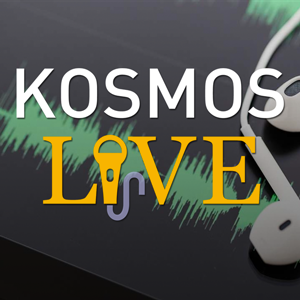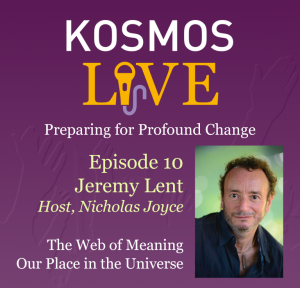KOSMOS LIVE PODCAST SERIES Preparing for Profound Change
This podcast series, Preparing for Profound Change, explores the converging challenges facing our world and offers strategies for coping with what lies ahead. Economic turmoil, climate chaos, political upheaval – these may seem like forces to fear, but in fact offer us deep opportunities for transformation.
Episode 10 – Jeremy Lent, The Web of Meaning, with Host, Nicholas Joyce
Guest, Jeremy Lent is author of The Patterning Instinct: A Cultural History of Humanity’s Search for Meaning, which investigates how different cultures have made sense of the universe and how their underlying values have changed the course of history. His new book, The Web of Meaning: Integrating Science and Traditional Wisdom to Find Our Place in the Universe, was published in Spring 2021.
Host, Nicholas Joyce is a whole systems designer and energetic architect. Formerly on the board of the Global Ecovillage Network and Foundation for Intentional Community, he now spends his time focused on ONEBoulder, a unique and gamified approach to introducing practices and principles of regenerative culture to a city of +100,000 people.
Jeremy Lent | A lot of what the book is about is showing how, what modern science tells us, whether it’s systems thinking, complexity science, or evolutionary biology, or cognitive science, actually points to the same deep wisdom that some of the greatest wisdom traditions of the world have been telling us for millennia. Whether it’s Buddhism, Taoism or indigenous knowledge from around the world. Similarly, what the cognitive understanding tells us points to the wisdom of the hearts, of actually of our feelings.
Western thought teaches that our mind is totally separate from our body, and therefore our feelings don’t have validity. And the notion of an integrated intelligence is not to deny the importance and value of that conceptual thinking, but to look at how we can use that very special, uniquely human gift and apply that to this recognition of what I call our animate consciousness, or our animate intelligence, which is the intelligence that we share with all of nature. That’s the intelligence we see not just in other mammals around us, like dolphins, or elephants, or chimpanzees who are highly intelligent in ways that we recognize; but even in trees, and ecosystems, and even in single cells – the deep intelligence of nature.
Within each of us as humans, that deep intelligence shows itself in the ways in which we feel, especially when we’re interacting with somebody. But because of the fact that we’ve all been socialized and conditioned, it’s difficult sometimes to trust our feelings.
Nick Joyce | Yes, absolutely. The theme for this Kosmos Quarterly is Realigning with Earth Wisdom. I’m wondering if you could speak a little bit to how you think people can get back in touch with our animate intelligence.
Jeremy Lent | What I call animate intelligence, and Earth wisdom, is a very similar take on the same thing, which is this recognition that life itself has spent billions of years here on Earth, evolving ways of doing things and being healthy as part of bigger ecosystems and showing incredible intelligence. Again, from our mainstream thinking, we’re used to thinking of humans as being smarter than any other creature, and that ‘artificial intelligence’ is somehow way beyond anything that nature has ever done. And in the book I compare the two different ‘AIs’: artificial intelligence and animate intelligence.
What’s amazing is, thanks to science we’ve begun to understand in recent decades, that even at the level of a single cell – (and we have 40 trillion of them in our bodies) – one single cell is capable of ways of making sense of the world in ways even our most advanced super computers can’t actually do. A cell senses thousands of things at the same time, and goes through unbelievably complex processes of figuring out what it’s doing, and communicating with other cells around it. This is part of an unfolding of evolution of billions of years.

And when you look at things – what we think of as inanimate natural things – like trees or plants, we now know that, not only do trees or plants have multiple senses, over a dozen senses, more than we can even imagine or think about, they even communicate with each other through ecosystems, and what’s been now called the ‘Wood Wide Web’ by biologist Suzanne Simard.
So there’s actually true collective intelligence all around us that we’re only beginning to recognize. That’s the intelligence of nature. One of the great elements of that Earth wisdom that’s evolved over billions of years is recognizing the power of cooperation. We’ve been told from our textbooks, from Richard Dawkins, and The Selfish Gene, and all that stuff, that nature has evolved to be supremely competitive. The opposite is actually true.
This is not wishful thinking. This is the result of scientific analysis of how evolution actually occurred, that the major steps in evolution, from prokaryotes, to cells with a nucleus, to multicellular animals, to communities, to mammals and to humans… every step increases an organism’s learning to cooperate with each other, which has led to the rich diversity of life on Earth right now.
A lot of listening to Earth’s wisdom is to recognize what the Earth itself, what Gaia itself, is telling us about how life can actually be lived in a more flourishing way, both for individual organisms and to flourish as part of something much, much bigger.
Listen Now
READ: The Conversation in Kosmos
Links for this Podcast
-
Website: Jeremylent.com
-
Book: The Patterning Instinct: A Cultural History of Humanity’s Search for Meaning
-
Organization: The Liology Institute
-
Santiago Theory of Cognition created by Humberto Maturana and Francisco Varela
Credits
 This Kosmos Live series, Preparing for Profound Change, is made possible by Immediacy, leading creators of educational media for learners of all ages everywhere. And, by Kosmos Community, dedicated supporters of the Kosmos mission – transformation in harmony with all Life.
This Kosmos Live series, Preparing for Profound Change, is made possible by Immediacy, leading creators of educational media for learners of all ages everywhere. And, by Kosmos Community, dedicated supporters of the Kosmos mission – transformation in harmony with all Life.Balancing a sober understanding of the of the collective challenges we face, with heart-centered response, calls for deep awakening by individuals, communities and societies. Our guests share their personal practices, strategies, and insights to help us manage our strong emotions and step forward to play positive proactive roles during these troubling times.
What skills, competencies and capacities will be most valued in the new world? How can our own inner practices keep us free from anxiety as we prepare body, mind and spirit for profound change? See other episodes in this series here.


